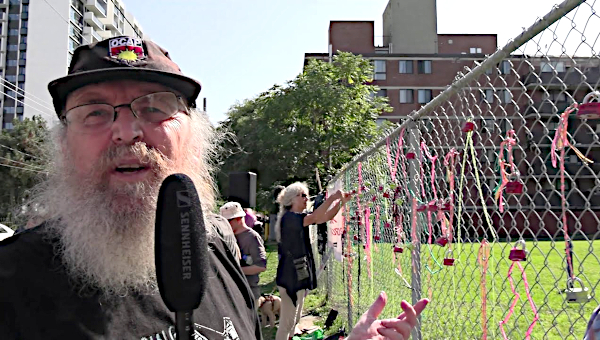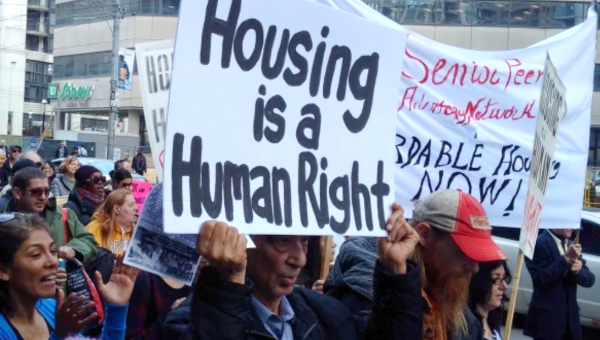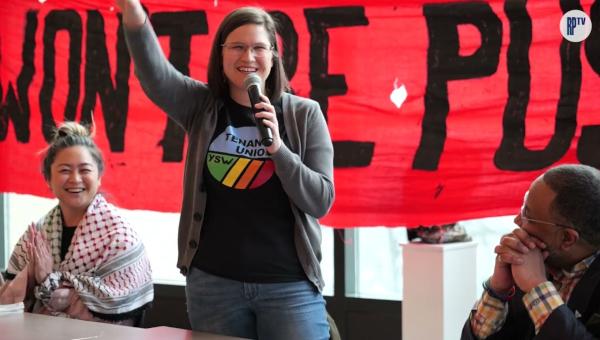A Call to Action Against the Cuts to Come
Submission on the Ontario Provincial
Pre-Budget ‘consultations’
The Ontario Government’s pre-budget consultations are currently underway at Queen’s Park. The Federal budget is set to be released at the beginning of March (that is unless Harper decides for another spontaneous vacation), with the Ontario Budget, and most Provincial budgets, then set to be released by the end of March or beginning of April.
It will, no doubt, be the same tired old routine. Agencies, services, and organizations will line up to sing for their supper in front of the all-party Standing Committee on Finance and Economic Affairs. The committee will be sent the same message that the government has gotten and ignored time and time again – that people in this province are suffering, that the people of Ontario cannot handle further cuts to programs or cuts to jobs, that their poverty reduction strategy is failing and that this province desperately needs to see a raise in funding for social assistance, childcare, and education.
Poor and working class people living in this province have a lot to worry about in this year’s budget. We are in an economic crisis and both the Federal and Provincial governments have made more than thinly veiled threats of cuts to come in the name of reducing bloated deficits.
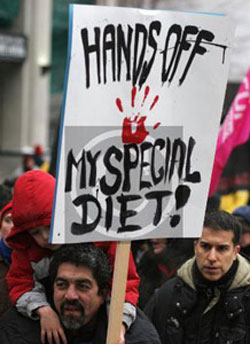 With so much to lose, we cannot afford to put our faith in the pre-budget consultations process. Instead of playing their game and politely pleading our case behind closed doors, we are making our submission to the poor and working class people in Ontario – the vast majority of people in this province. This is our call to action.
With so much to lose, we cannot afford to put our faith in the pre-budget consultations process. Instead of playing their game and politely pleading our case behind closed doors, we are making our submission to the poor and working class people in Ontario – the vast majority of people in this province. This is our call to action.
The Ghosts of Flaherty’s Past:
Dear rest-of-Canada: take it from Ontario, with Flaherty at the helm of Canada’s economy we can be sure that some brutal times are ahead. Our old friend, Mr. Jim Flaherty was the man wielding the ax in Ontario’s Tory Regime in the 90s – slashing all services and attacking the public sector without blinking. We should be terrified of his plans on the Federal level because Harper appointed him to do to Canada what he already did to Ontario. Flaherty will be working hand-in-hand with the newly appointed President of the Treasury Board Stockwell Day – a man who is known not only for his belief that dinosaurs and humans walked the earth together, but also for his ‘Say No’ attitude when it comes to social spending.
Harper has stated (in the Globe and Mail) that “it is essential that the government limit public spending,” and that “the provinces will have to make some of the same difficult decisions we are making…” Harper, Flaherty, Day: this is an all-star line-up from neoliberal hell. We should be under no illusions that they will ‘play nice’ this time around.
Dwight Duncan Fills Flaherty’s Shoes:
What Flaherty and Harper have called ‘belt-tightening,’ is what Ontario Minister of Finance Dwight Duncan calls “difficult choices ahead” (see Toronto Star). In October, Dwight Duncan announced that Ontario was facing a deficit of $24.7-billion dollars. Immediate speculation began on where cuts would be made. Will it be Healthcare? Will it be the Public sector? Will it be Social Assistance? Will it be ‘Dalton Days’? Clearly, the option of NOT making cuts to the basic needs of poor and working people was never on the table.
On December 7, 2009, the Ontario Provincial Auditor’s report was released. A major section of the Auditor’s report was dedicated to Ontario Works and the Ontario Disability Support Program. The report launches one attack after another on social assistance recipients from claims of massive overpayments to fraud. These attacks are all too familiar – we see them every time capitalism is in crisis. Nobody is surprised when the governments blame poor people for the province’s financial woes – it’s the perfect distraction from the fact that the deficit was caused by tax cuts to the rich and bailouts for banks and big business. The Auditor’s report fits perfectly within this ‘blame the poor’ plan and this supposed ‘external and independent review’ has become the primary tool of the Provincial government to legitimize cuts to services in the name of ‘efficiency’ and ‘fiscal responsibility.’
How Did We Get Here?
In 1995, Ontario Works was slashed by 21.6% by none other than Jim Flaherty, then Ontario’s Finance Minister under the leadership of Premier Mike Harris. The Common Sense Revolution in Ontario saw significant tax cuts for the rich while social programs and public services were being devastated.
In 2003, the Liberals were elected to power on the promise of an end to the poverty regime. These empty promises have done nothing to end poverty. The reality is that today people in Ontario in many ways are worse off than 15 years ago. Social assistance rates have been raised by a total of 6% since 2003. The government may try to fool us into thinking they have made positive changes, but the truth is that today, people on social assistance are living on rates that have been reduced by 40% when you take in to account the cost of living increase. Six percent is such a small increase that it does not even account for inflation on, say, vegetables.
700,000 people in Ontario live on Social Assistance, the vast majority of that number are children. The basic amount for a single person living on social assistance is $572/month (which is meant to break down to $356 for shelter and $216 for basic needs), for a single parent with one child it is $920/month ($560 for shelter and $360 for basic needs). Disability income rates are only slightly higher, and ODSP (Ontario Disability Support Program) is a purposefully difficult program to qualify for – gaining access usually requires appeal processes and long waiting periods.
In 2005, the Ontario Coalition Against Poverty launched the Raise the Rates campaign to demand a 40% raise in Welfare and Disability rates and a living wage (See: update.ocap.ca/rtr). Not long after, people on Welfare and Disability became aware of the now well-known Special Diet supplement. The Special Diet supplement is extra money (up to $250) that people are entitled to on top of their monthly cheque if a health care practitioner determines that this extra money is required to buy food for medical reasons. Many health care providers were eager to sign people up for extra money because they understand that poverty is a social determinant of poor health. Nobody living on welfare and disability can afford to eat properly and they are therefore all at risk for serious health problems. This has led many health care providers to argue that there should be nothing ‘special’ about the special diet – everyone on welfare and disability needs this money for health reasons. These health care providers were determined to push for access to better income levels for people on social assistance.
The Special Diet became a phenomenon – word spreading like wildfire in poor communities resulting in ‘Hunger Clinics’ being held across the province. Many poor people in Ontario gained access to desperately needed resources and were able to put food on the table using the Special Diet money. Everyone knew, of course that it was only a matter of time before the government targeted this vital program. It is no surprise that this year’s Auditor’s report took aim at the Special Diet. The Auditor focused on the fact that the Special Diet spending in the province increased from $5-million in the 2002/03 fiscal year, to $67-million in the 2008/09 fiscal. This is a fact that the Ontario Coalition Against Poverty is proud of – advocacy for the supplement forced the government to spend millions feeding poor people in Ontario.
Of course, the province and the city treat the Special Diet increases as an embarrassment – a blight on their otherwise outstanding record of denying poor people access to a decent standard of living. They have seized on the Auditor’s Report and cried ‘welfare fraud’ in order to justify steps that will be taken to ensure that poor people are denied access to the Special Diet.
It is important to understand the Special Diet within the context of the welfare system where people are forced to apply for ‘extra’ funding to cover basic necessities that are not covered by appallingly low OW and ODSP rates. People apply for the Special Diet allowance in order to eat, in the same way that people apply for transportation money to access public transit, for Community Start-up to try to avoid evictions or move after having faced an eviction, and Burial money for a family funeral. These ‘extra benefits’ are just that – they are extra meaning that not everyone has access to them. For years, many of these benefits were on the books, but were not publicized and therefore not accessed. We have worked hard to ensure that people on disability and welfare are made aware of, and fight for access to all the benefits, however inadequate, that they are entitled to.
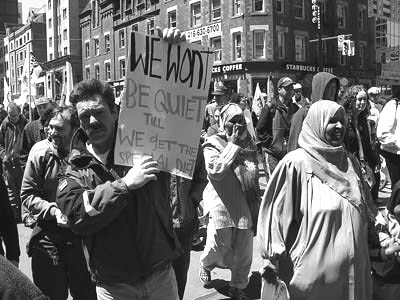 In the face of the government’s accusations of widespread fraud, we must emphasize that it is not fraudulent for hungry people to apply for the Special Diet – it is a necessity in a system that forces people to live in poverty and to have to decide from month to month whether to pay the rent or put food on the table. The dramatic increase in people accessing the Special Diet is not an indication of fraud: it is an indication of a hunger problem and a looming health crisis in this province. It should raise alarm bells for the Health Care system that people living on Social Assistance in this province are living with poor health as a direct result of poverty conditions. There are huge health consequences when people cannot afford to buy healthy and nutritious food, when they cannot afford to avoid the foods that they are allergic to and when thousands are living with the extreme stress of trying to survive and support their family in dire circumstances. Poor people suffer from poor health – this is a fact that the government ignores at their own peril.
In the face of the government’s accusations of widespread fraud, we must emphasize that it is not fraudulent for hungry people to apply for the Special Diet – it is a necessity in a system that forces people to live in poverty and to have to decide from month to month whether to pay the rent or put food on the table. The dramatic increase in people accessing the Special Diet is not an indication of fraud: it is an indication of a hunger problem and a looming health crisis in this province. It should raise alarm bells for the Health Care system that people living on Social Assistance in this province are living with poor health as a direct result of poverty conditions. There are huge health consequences when people cannot afford to buy healthy and nutritious food, when they cannot afford to avoid the foods that they are allergic to and when thousands are living with the extreme stress of trying to survive and support their family in dire circumstances. Poor people suffer from poor health – this is a fact that the government ignores at their own peril.
The government can either choose to pay the cost of providing proper income levels for everyone on OW and ODSP, or they can pay the higher human and financial cost of the inevitable health care bills that result from forcing people to live in poverty.
Neither the health nor general well being of poor people in this province is a line item in the upcoming budget. If anything, their health and well-being is up on the chopping block. It is no coincident that Ontario’s Minister of Community and Social Services, Madeleine Meilleur, is the co-chair of the Treasury Board Panel charged with ‘reducing the deficit.’ Who better to determine how to best erode social services than the Minister in charge of providing them?
Why Such Little Faith in
the Poverty Reduction Strategy?
At the time of publishing, the province has issued a ‘memo’ giving front-line OW and ODSP workers the authority to reassess ‘the legitimacy of any Special Diet claim’ (See a copy of the memo). Workers with no medical training are being given the power to a) second-guess and question the diagnoses of a medical practitioner, and b) to deny people access to the Special Diet on a totally unaccountable and arbitrary basis. In what is clearly a move to quietly cut services and save money in the midst of the deficit, Social Services workers are being asked by the province to, play doctor by overriding medical decisions in order to deny peoples’ legitimate claims.
Using the Auditor’s Report as justification, this new provincial directive is laying the groundwork for eliminating the Special Diet, without the government having to explicitly say that is what they are doing. Already, we are seeing the denial of the Special Diet on a massive scale, along with a general escalation of abuse against people on social assistance.
Although no cut to Ontario Works has been officially made on paper, denying thousands of people the Special Diet, is in fact a significant cut to social assistance, or worse, the pre-cursor to more brutal cuts to come. The province is creating an atmosphere of criminalization, and in the case of the Special Diet, facts on the ground from which to justify very serious cuts. For those of us who lived on social assistance through the Harris days – this atmosphere is all too familiar. It is a return to the days of ‘Workfare,’ ‘welfare fraud,’ ‘criminals.’
In the City of Toronto, Welfare is administered by Social Services – overseen through Janet Davis’ Committee on Community Development. City officials are playing their part in cutting social assistance by doing the province’s bidding and denying access to the Special Diet and other programs. They are administering devastating cuts at a time when they should be standing up against the province. It is under their watch that entire families are being denied the Special Diet benefit. In this city, the process of applying for all benefits – basic and ‘extra’ – has become so riddled with suspicion and accusations of fraud, that qualifying is almost impossible.
We Didn’t Create This Crisis
Politicians and economists alike somehow believe that staying the course of a neoliberal model will keep their heads above water in this failing economy. Dwight Duncan, Ontario’s Minister of Finance, boasts that new corporate friendly measures “…brings our total corporate tax cuts over the next three years to more than $3-billion.” (Dwight Duncan, State of Ontario’s Economy, March 3rd, 2008.)
When the economic crisis first hit, and as it has deepened, billions of dollars of public money have been poured in to the financial system through the form of bailouts and tax cuts. That is where the deficit comes from, not from ‘overspending’ to create jobs and public services, and certainly not from ‘fraudulent welfare claims.’ The government is looking now to get that money back, and we can be sure that it is not the financial elite who will be paying the price. The method of deficit reduction is clear – to privatize public holdings, and to cut public and social services.
When they say that ‘tough times are ahead,’ they mean tough times for us. In a climate where the public sector and social services have not even recovered from the Tory era, we know that any further cuts will most certainly be devastating. For people on social assistance it will be a very serious crisis.
We are in a crucial time period where nothing will be provided for the needs of poor and working class people unless we fight and especially unless we fight together. The Ontario Coalition Against Poverty (OCAP) is renewing our commitment to the Raise the Rates campaign in demanding a dignified and livable income for unemployed people and working people across this province. We intend to mobilize local communities to take the action necessary to challenge and defeat the abuses they face at the hands of the social assistance system. We will act to defend the right of people to obtain the Special Diet and other benefits that are being held back. We will also work to bring together this locally based resistance into a general ‘Raise the Rates’ movement that can take up the fight for decent income in this province. This will be taken forward on April 15th, 2010 with a major OCAP mobilization against the Liberal Government that will demand a 40% increase in welfare and disability rates. Governments intend to impose this crisis on us but, through our resistance, we must create for them a political crisis and fight for lives free of poverty. •



